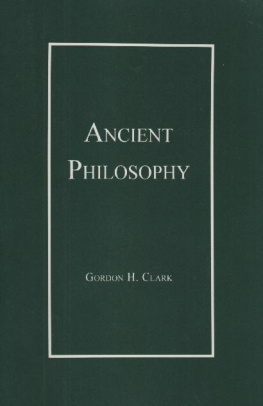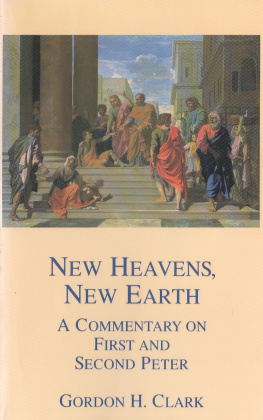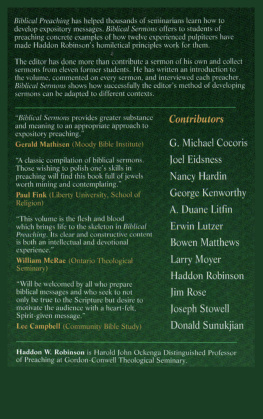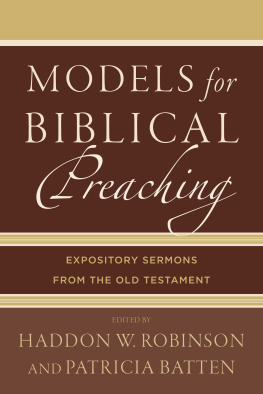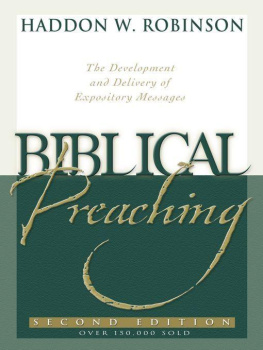Gordon Haddon Clark - The biblical doctrine of man
Here you can read online Gordon Haddon Clark - The biblical doctrine of man full text of the book (entire story) in english for free. Download pdf and epub, get meaning, cover and reviews about this ebook. City: Jefferson, Md. (P.O. Box 700, Jefferson 21755), year: 1992, publisher: Trinity Foundation, genre: Science. Description of the work, (preface) as well as reviews are available. Best literature library LitArk.com created for fans of good reading and offers a wide selection of genres:
Romance novel
Science fiction
Adventure
Detective
Science
History
Home and family
Prose
Art
Politics
Computer
Non-fiction
Religion
Business
Children
Humor
Choose a favorite category and find really read worthwhile books. Enjoy immersion in the world of imagination, feel the emotions of the characters or learn something new for yourself, make an fascinating discovery.
- Book:The biblical doctrine of man
- Author:
- Publisher:Trinity Foundation
- Genre:
- Year:1992
- City:Jefferson, Md. (P.O. Box 700, Jefferson 21755)
- Rating:4 / 5
- Favourites:Add to favourites
- Your mark:
- 80
- 1
- 2
- 3
- 4
- 5
The biblical doctrine of man: summary, description and annotation
We offer to read an annotation, description, summary or preface (depends on what the author of the book "The biblical doctrine of man" wrote himself). If you haven't found the necessary information about the book — write in the comments, we will try to find it.
The biblical doctrine of man — read online for free the complete book (whole text) full work
Below is the text of the book, divided by pages. System saving the place of the last page read, allows you to conveniently read the book "The biblical doctrine of man" online for free, without having to search again every time where you left off. Put a bookmark, and you can go to the page where you finished reading at any time.
Font size:
Interval:
Bookmark:
Gordon H. Clark
The Trinity Foundation Jefferson, Maryland
1984 The Trinity Foundation Post Office Box 700 Jefferson, Maryland 21755
Second edition 1992 The Trinity Foundation ISBN: 0-940931-91-5
In twentieth century America there are many views of man. One of the most popular is the naturalist view. The naturalist view is that man is the result of an accidental collocation of atoms: Mans number came up in the Monte Carlo games is the way one humanist, Jacques Monod, put it.
This is in stark contrast to the Biblical view, expressed by David in the eighth Psalm:
What is man that you are mindful of him,
And the son of man that you visit him?
For you have made him a little lower than the angels,
And you have crowned him with glory and honor.
You have made him to have dominion over the works of your hands;
You have put all things under his feet.
This view of man, once very influential in America and throughout the world, has been subject to the prolonged attack of militant secularists. According to the naturalist view of man, God is not mindful of man, for there is no God. Even were God to exist, he would not, or could not, be conscious of man. Nor has God intervened in human history at any time. And far from being a little lower than the angels (the Hebrew actually has Elohim, God) man is, perhaps, a little greater than the amino acids from which he effervesced. Certainly such a position is not one of glory and honor, and man has no right to lord it over the rest of the earth; rather, he must preserve the earth. Nothing ought to be under mans feet; that is the worst form of speciesism.
The naturalist view denies every proposition that David wrote. That view has found its most eloquent expression in the words of the British mathematician and philosopher Bertrand Russell:
That man is the product of causes that had no prevision of the end they were achieving; that his origin, his growth, his hopes and fears, his loves and his beliefs, are but the outcome of accidental collocations of atoms; that no fire, no heroism, no intensity of thought and feeling can preserve an individual life beyond the grave, that all the labors of the ages, all the devotion, all the inspiration, all the noonday brightness of human genius are destined to extinction in the vast death of the solar system, and the whole temple of Mans achievement must inevitably be buried beneath the debris of a universe in ruinsall these things, if not quite beyond dispute, are yet so nearly certain, that no philosophy which rejects them can hope to stand. Only within the scaffolding of these truths, only on the firm foundation of unyielding despair, can the souls habitation henceforth be safely built....
Brief and powerless is Mans life; on him and all his race the slow, sure doom falls pitiless and dark.
Blind to good and evil, reckless of destruction, omnipotent matter rolls on its relentless way; for Man, condemned today to lose his dearest, tomorrow himself to pass through the gate of darkness, it remains only to cherish, ere yet the blow falls, the lofty thoughts that ennoble his little day.... proudly defiant of the irresistible forces that tolerate, for a moment, his knowledge and his condemnation, to sustain alone, a weary but unyielding Atlas, the world that his own ideals have fashioned despite the trampling march of unconscious power.
It is no accident that both Monod and Russell began by denying God and end by advocating the creation of a totalitarian world government. Monod called for some form of world authority to manage a stable-state society. Russell advocated the creation of a single world-wide authority, possessing a monopoly of all the more serious weapons.... the vital point is the placing of irresistible force in the hands of the central authority.... The central Government may be democratic or totalitarian; it may owe its origin to consent or to conquest....
I do not believe that the human race has sufficient statesmanship or capacity for mutual forbearance to establish a world Government on a basis of consent alone. That is why I think that an element of force will be needed in its establishment and in its preservation through the early years of its existence.... Modern man is master of his fate.
Those who attack God attack his image, man. They have no scruples about herding and slaughtering men like animals. Despite what Russell said, modern man is not the master of his fate. What Russells phrase actually means is that some men are masters of the fates of other men. The totalitarianism of the humanists is a logical and inexorable consequence of their humanism.
The Biblical Doctrine of Man is a most necessary book, least of all for political reasons. There are spiritual as well as political totalitarians at work in the world, and the doctrines they teach, if believed, will lead one to hell, not merely to a concentration camp. Many of their opinions have the appearance of piety, just as the Devil himself sometimes appears as an angel of light.
The spiritual totalitarians teach that mans mind is incapable of knowing God: Barth and Kierkegaard maintain that man must understand and believe contradictions about God, for God is totally different from man. Still others teach that human language is incapable of expressing divine truth. And all would have us believe that the Bible itself contains irreconcilable contradictions. These views, which implicitly deny that man is the likeness of God, subvert all Christianity, for Christianity asserts that man can know God, that the Bible is both mans words and Gods words, and that it contains no error. The truth, as Christ said, shall make us free. We sometimes forget that he first said, You shall know the truth.
The proper view of man is second in importance only to the proper view of God. If either is misunderstood or rejected, the consequences for this life are death and tyranny; the consequences for the next life are infinitely worse: never-ending hell.
John Robbins December 1991
In 1895 John Laidlaw, Professor of Theology in New College, Edinburgh, published his revised edition of Bible Doctrine of Man. It is a masterpiece, and every theological student should study it with great care. The present attempt cannot equal it; but perhaps some references to twentieth century developments, and inevitably from another persons perspective, may justify this attempt. What unfortunately justifies this attempt to a greater degree is the disturbing fact that so few contemporary students have read its illustrious predecessor.
The main topics discussed here are the creation of man, the nature of man as given in creation, the propagation of the soul to Adams descendants, the religious relation of Adam as the first man to his posterity, and the effects of sin, noetic and otherwise. The subject matter is somewhat more complicated than these section headings may suggest.
God created man, men, the human race as he also created the solar system and the sand of the sea. It hardly needs mention that the Bible teaches a theistic philosophy. But though equally created, man differs from the sea and the solar system in nature and importance. The physical universe is but a backdrop or stage setting for the Divine Comedy in which man is the main actor. In the largest sense God is the main actor, as well as the author. But among created things, when history is taken as the drama of redemption, man plays the title role. Some people, called scientists, legitimately study the stage setting with its lighting arrangements, but the plays the thing.
Now first, the Bible definitely asserts that man was created.
Genesis 1:27 So God created man in his own image, in the image of God created he him; male and female, created he them.
Font size:
Interval:
Bookmark:
Similar books «The biblical doctrine of man»
Look at similar books to The biblical doctrine of man. We have selected literature similar in name and meaning in the hope of providing readers with more options to find new, interesting, not yet read works.
Discussion, reviews of the book The biblical doctrine of man and just readers' own opinions. Leave your comments, write what you think about the work, its meaning or the main characters. Specify what exactly you liked and what you didn't like, and why you think so.




